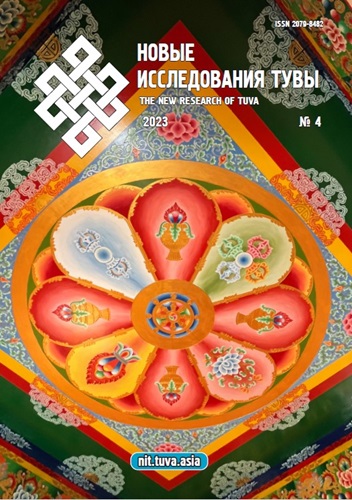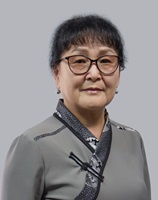The image of a woman in the linguistic picture of the world of Tuvans and Russians (based on the material of phraseology in paroemias)
DOI:
https://doi.org/10.25178/nit.2023.4.3Keywords:
Tuvans; Tuva; comparative linguoculturology; Tuvan culture; portrayal of women; proverb; semantic component; semantic fieldAbstract
The article presents a linguocultural and lexical-semantic analysis of proverbs and sayings in the Tuvan and Russian languages, delving into the portrayal of women. The significance of addressing this issue stems from the growing interest in gender studies across diverse scientific domains, including comparative linguistics and linguoculturology. Linguistics acknowledges the importance of capturing the specificity of ethnic mentality, character, and culture within language, particularly within phraseology.
In the course of this research, the most frequently used phraseological units were selected for a lexical-semantic analysis. This approach facilitated the identification of similarities and differences in the ways women are characterized, entwined with specific sociocultural connotations. The primary similarity in characterizing women in Tuvan and Russian proverbs lies in the convergence of key lexemes with a neutral connotation. However, Russian phraseological units tend to be dominated by emotionally charged lexical items, often with negative undertones. Universal and specific semantic components related to the feminine theme within both the core and peripheral zones were defined, along with their interrelation in the compared languages. The analysis revealed discrepancies in the content of the core and peripheral zones of Tuvan and Russian phraseological units concerning their feminine references.
The study also explores the semantic component of “motherhood”, pivotal in both linguocultures. Russian proverbs provide a more detailed everyday portrayal of the mother, emphasizing the integrity and sublimity of this image, whereas Tuvan phraseological units tend to emphasize specific qualities. The article outlines a spectrum of common and distinct personal traits attributed to women within these phraseological units. Shared negative characteristics include talkativeness and lack of thrift, as well as a certain attitude towards female beauty, which is often perceived as lacking special value. In Tuvan proverbs, emphasis is placed on qualities essential for fulfilling familial roles, such as thrift and practical wisdom, while Russian sayings frequently criticize typical female flaws.
References
Anzhiganova, L. V. and Ak-Lama, S. M. (2016) Mir zhenshchin sovremennoi Tuvy [Women’s world in contemporary Tuva]. New Research of Tuva, no. 2, pp. 105–115. (In Russ.).
Baizhanova, N. R. (2004) Metaforicheskie obrazy, kharakterizuiushchie cheloveka, v altaiskikh poslovitsakh (v sopostavlenii s tuvinskimi) [Metaphorical images characterizing a person in Altai proverbs (in comparison with Tuvan ones)]. In: Yazyki korennykh narodov Sibiri [Languages of the indigenous peoples of Siberia] ed. by N. B. Koshkareva, N. N. Shirobokova and A. R. Tazranova. Issue 14. Novosibirsk, NGU. 236 p. Pp. 60–72. (In Russ.).
Bolat-ool, R. V. and Pelevina, N. N. (2017) Formirovanie obraza zhenshchiny v tuvinskikh i nemetskikh poslovitsakh [On woman’s image in Tuvan and German proverbs]. Vestnik Khakasskogo gosudarstvennogo universiteta im. N. F. Katanova, no. 21, pp. 29–32. (In Russ.).
Bochina, T. G. (2022) Kontrast v tuvinskikh poslovitsakh [Contrast in Tuvan Proverbs]. New Research of Tuva, no. 1, pp. 37–46. (In Russ.). DOI: https://doi.org/10.25178/nit.2022.1.3
Bredis, M. A., Ivanov, Eu. Eu., Lomakina, O. V., Nelyubova, N. Yu. and Kuzhuget, Sh. Yu. (2021) Leksikograficheskoe opisanie tuvinskikh poslovits: printsipy, struktura, etnolingvokul’turologicheskii kommentarii (na evropeiskom paremiologicheskom fone) [A lexicographical description of Tuvan proverbs: Principles, structure and an ethnolinguoculturological commentary as compared to European paremies]. New Research of Tuva, no. 4, pp. 143–160. (In Russ.). DOI: https://doi.org/10.25178/nit.2021.4.11
Wang, M. (2018) Obraz zhenshchiny vo frazeologizmakh russkogo i kitaiskogo iazykov [tThe image of women in the phraseological units of Russian and Chinese languages]. Bulletin of Chelyabinsk State University, no. 4 (414), issue 112, pp. 44–49. (In Russ.).
Vorob'ev, V. V. and Poliakova, G. M. (2012) Sopostavitel'naia lingvokul'turologiia kak novoe nauchnoe napravlenie [Comparative linguaculture as a new scientific trend]. Vestnik RUDN. Seriia: Russkii iazyk i inostrannye iazyki i metodika ikh prepodavaniia, no. 2, pp. 13–19. (In Russ.).
Glushchenko, O. A. and Prudnikova, E. S. (2013) Stereotipnye obrazy zhenshchiny i muzhchiny v zerkale russkoi iazykovoi kul'tury [Stereotypical images of women and men in the mirror of Russian language culture]. Petropavlovsk-Kamchatskii, Kamchat. gos. un-t im. Vitusa Beringa. 208 p. (In Russ.).
Dorzhu, Z. Yu. (2012) Tsennostnye orientatsii zhenshchin Tuvy kak faktor politicheskoi aktivnosti [Value orientations of Tuva women as a factor of political activity]. Vestnik Tuvinskogo gosudarstvennogo universiteta. Sotsial'nye i gumanitarnye nauki, no. 1, pp. 37–39. (In Russ.).
Dorzhu, Z. Yu. and Ochur, N. M. (2018) Rol' obrazovaniia v izmenenii polozheniia zhenshchin v Tuvinskoi Narodnoi Respublike [The role of education in the transformation of the status of women in the Tuvan people’s republic]. Woman in Russian Society, no. 1 (86), pp. 106–114. (In Russ.). DOI: https://doi.org/10.21064/WinRS.2018.1.10
Dorzhu, Z. Yu. and Dash, L. A. (2017) Zhenskoe prostranstvo v traditsionnoi kul'ture tuvintsev: k istoriografii voprosa [Women's Space in the Traditional Culture of Tuvinians: towards the Historiography of the Issue]. Vestnik Tuvinskogo gosudarstvennogo universiteta. Sotsial'nye i gumanitarnye nauki, no. 1, pp. 42–48. (In Russ.).
Egorova, A. I., Kondakova, A. P. and Kuzhuget, M. A. (2020) Gendernye stereotipy v tuvinskikh poslovitsakh i pogovorkakh [Gender stereotypes in Tuvan proverbs and sayings]. New Research of Tuva, no. 1, pp. 19–34. (In Russ.). DOI: https://doi.org/10.25178/nit.2020.1.2
Egorova, A. I., Chochkina, M. P. and Sarbasheva, S. B. (2019) Psikholingvisticheskii analiz gendernykh stereotipov v altaiskikh i iakutskikh poslovitsakh [Psycholinguistic analysis of gender stereotypes in Altai and Yakut proverbs]. Tomsk Journal of Linguistics and Anthropology, no. 2, pp. 51–63. (In Russ.). DOI: https://doi.org/10.23951/2307-6119-2019-2-51-63
Zabelina, G. A. (2010) Zhenshchiny Tuvy v sem'e i obshchestve v pervoi polovine XX veka [Women of Tuva in the family and society in the first half of the twentieth century]. Kyzyl, TuvIKOPR SO RAN. 118 p. (In Russ.).
Kara-ool, L. S. (2006) Terminy rodstva i svoistva v tuvinskom yazyke [Kinship and in-law terms in the Tuvan language]. Kyzyl, Tuvan State University. 252 p. (In Russ.).
Kirilina, A. V. (1999a) Russkie poslovitsy i pogovorki: ne tol'ko androtsentrizm [Russian proverbs and sayings: not only androcentrism]. Vestnik Tambovskogo gosudarstvennogo universiteta. Seriia: Gumanitarnye nauki, no. 3 (15), pp. 41–43. (In Russ.).
Kirilina, A. V. (1999b) Gender: lingvisticheskie aspekty [Gender: linguistic aspects]. Moscow, Institut sotsiologii RAN. 189 p. (In Russ.).
Kurbatskii, G. N. (2001) Tuvintsy v svoem fol'klore (istoriko-etnograficheskie aspekty tuvinskogo fol'klora) [Tuvans in their folklore: Historical and ethnographic aspects of Tuvan folklore)]. Kyzyl, Tuva book publishing house. 464 p. (In Russ.).
Kuular, E. M. (2012) Iugo-vostochnyi dialekt tuvinskogo iazyka [The southeastern dialect of the Tuvan language]. Kyzyl, Tuvinskii gos. un-t. 213 p. (In Russ.).
Kuular, S.-S. V. (2020) Tsennostnye prioritety sovremennoi tuvinskoi sem'i: opyt issledovaniia [Value priorities of the modern Tuvan family: research experience]. Mir nauki, kul'tury, obrazovaniia, no. 6 (85), pp. 40–42. (In Russ.). DOI: https://doi.org/10.24412/1991-5500-2020-685-40-42
Mokienko, V. M. (1989) Slavianskaia frazeologiia [Slavic phraseology]. Moscow, Vysshaia shkola. 287 p. (In Russ.).
Natsak, O. D. (2021) Osobennosti gendernoi asimmetrii v sovremennoi tuvinskoi sem'e [Gender asymmetries of modern tuvan family revisited]. Biulleten' KalmNTs RAN, no. 2, pp. 120–143. (In Russ.). DOI: https://doi.org/10.22162/2587-6503-2021-2-18-120-143
Natsak, O. D. (2021b) Osobennosti politicheskoi sotsializatsii zhenshchin v Tuvinskoi Narodnoi Respublike (1921–1944 gg.) [Features of Political Socialization of Tuvan Women: Historical Comments and Modern Trends (1921–1944)]. Vlast’ (The Authority), vol. 29, no. 4, pp. 231–239. (In Russ.). DOI: https://doi.org/10.31171/vlast.v29i4.8410
Natsak, O. D. (2022a) Transformatsiia reproduktivnoi modeli tuvinskoi sem'i: istoricheskaia retrospektiva i sovremennye tendentsii [Transformation of the Reproductive Model of the Tuvan Family: Historical Retrospective and Current Trends]. Sotsiologicheskaia nauka i sotsial'naia praktika, no. 2 (38), pp. 52–71. (In Russ.). DOI: https://doi.org/10.19181/snsp.2022.10.2.9028
Natsak, O. D. (2022b) Raspredelenie gendernoi vlasti v sovremennoi tuvinskoi sem'e [The distribution of gender-based authority in the modern tuvan family]. Teoriia i praktika obshchestvennogo razvitiia, no. 2 (168), pp. 28–36. DOI: https://doi.org/10.24158/tipor.2022.2.3
Natsak, O. D. (2023) Zhenshchiny v publichnom diskurse v period Tuvinskoi Narodnoi Respubliki (istoriko-sotsiologicheskii analiz po materialam periodicheskoi pechati) [Women in the public discourse in the period of the Tuvan People’s Republic (A historical and sociological analysis based on materials of the periodical press)]. New Research of Tuva, no. 1, pp. 208–227. (In Russ.). DOI: https://doi.org/10.25178/nit.2023.1.12
Paremiologiia na perekrestkakh iazykov i kul'tur [Paremiology at the crossroads of languages and cultures] (2021) / M. A. Bredis et al. ; ed. by E. E. Ivanov and O. V. Lomakina. Moscow, RUDN Publ. 246 p. (In Russ.).
Problemy funktsional'noi grammatiki: polevye struktury [Problems of functional grammar: field structures] (2005) / ed. by A. V. Bondarko and S. A. Shubik. St. Petersburg, Nauka. 480 p. (In Russ.).
Prudnikova, E. S. (2011) Obraz zhenshchiny v soznanii nositelei russkogo iazyka (na materiale paremii) [The image of a woman in the minds of native speakers of the Russian language (based on the material of the paremias)]. Vestnik Nizhegorodskogo gosudarstvennogo lingvisticheskogo universiteta im. N. A. Dobroliubova, no. 15, pp. 100–107. (In Russ.).
Saidasheva, E. A. and Nurgalieva, L. A. (2016) Sopostavitel'nyi analiz peredachi gendernogo priznaka femininnosti v angliiskikh i russkikh poslovitsakh i pogovorkakh [Comparative analysis of the transmission of the gender attribute of femininity in English and Russian proverbs and sayings]. Filologicheskie nauki. Voprosy teorii i praktiki, no. 10–3 (64): in 3 p. P. 3, pp. 144–149. (In Russ.).
Samdan, Z. B. (2020) Transformatsiia obraza zhenshchiny kochevoi kul'tury v tuvinskoi literature (na primere tvorchestva A. M. Lamazhaa) [Transformation of the image of a woman of nomadic culture in Tuvan literature: the works by A. M. Lamazhaa]. New Research of Tuva, no. 3, pp. 228–239. (In Russ.). DOI: https://doi.org/10.25178/nit.2020.3.16
Soyan, A. M. (2016) Nravstvennye tsennosti v poslovitsakh i pogovorkakh tsagan-nurskikh i usinskikh tuvintsev [Moral values in proverbs and sayings of the Tuvans in Tsagan-Nur and Usinsk]. Mir nauki, kul'tury i obrazovaniia, no. 6, pp. 373–375. (In Russ.).
Sternin, I. A. (2007) Kontrastivnaia lingvistika. Problemy teorii i metodiki issledovaniia [Contrastive linguistics. Problems of theory and methodology of research]. Moscow, AST; Vostok-Zapad. 288 p. (In Russ.).
Teliia, V. N. (1996) Russkaia frazeologiia. Semanticheskii, pragmaticheskii i lingvokul'turologicheskii aspekty [Russian phraseology. Semantic, pragmatic and linguoculturological aspects]. Moscow, Shkola «Yazyki slavianskoi kul'tury». 288 p. (In Russ.).
Khomkova, L. R. (2019) Natsional'nye osobennosti realizatsii gendernykh otnoshenii v poslovitsakh i pogovorkakh nemetskogo i russkogo iazykov [National peculiarities of the implementation of gender relations in proverbs and sayings of the German and Russian languages]. Na peresechenii iazykov i kul'tur. Aktual'nye voprosy gumanitarnogo znaniia, no. 2 (4), pp. 66–72. (In Russ.).
Shanskii, N. M. (1996) Frazeologiia sovremennogo russkogo iazyka [Phraseology of the modern Russian language.]. St. Petersburg, Spetsial'naia literatura. 192 p. (In Russ.).
Published
How to Cite
For citation:
Varlamova I. Yu. , Budiltseva M. B. , Pugachev I. A. and Kuular E. M. Obraz zhenshchiny v iazykovoi kartine mira tuvintsev i russkikh (na materiale frazeologii v paremiiakh) [The image of a woman in the linguistic picture of the world of Tuvans and Russians (based on the material of phraseology in paroemias)]. New Research of Tuva, 2023, no. 4, pp. 44-60. DOI: https://doi.org/10.25178/nit.2023.4.3
Issue
Section

This work is licensed under a Creative Commons Attribution-NonCommercial 4.0 International License.

Author(s) license holder(s) grant rights for their work to the journal (grantee of a license) under the simple non-exclusive open license in accordance with Art. 1286.1 «Open license for a research work, work of literature or fine arts», Civil Code of the Russian Federation.
New Research of Tuva publishes articles under the Creative Commons Attribution-NonCommercial license (CC BY-NC).
Since it is an open license, author(s) reserve the right to upload the article to their institutional repository, submit it to another journal (if it allows republications), or republish it on their own website (in full, or in part).
However, several conditions apply here:
a) The republished version must always contain the name(s) and affiliation(s) of the author(s), the original title and the hyperlink to the original version on the New Research of Tuva website;
b) It must be in open access, free of charge, and no category of readers must be in any way whatsoever advantaged over general readership.
c) should the contribution be submitted elsewhere by its author(s) without substantial modification (30% or more of original text unchanged), the body of the article should contain a disclaimer that the original version was published in New Research of Tuva (with a link to the respective page)
The CC-BY-NC is a non-revocable license which applies worldwide and lasts for the duration of the work’s copyright.












